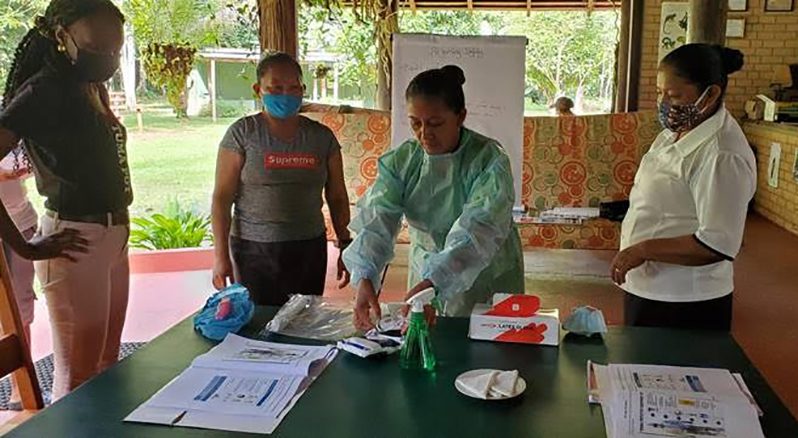OPERATORS and staff from the Rewa, Surama and Caiman House Eco-lodges, in Region Nine (Upper Takutu-Upper Essequibo) recently completed COVID-19 training and certification to facilitate the re-opening of their eco-lodges to safely bring tourists back to their communities during the COVID-19 pandemic.
According to a press release from the Canadian High Commission, the training project was executed by Wilderness Explorers in partnership with the Guyana Tourism Authority (GTA) and was funded by the High Commission of Canada.
The project, which was titled, “Restarting Tourism: Establishing Health and Safety Protocols for Eco-Lodges to Resume Operations During COVID-19,” aimed to assist in the resuscitation of economic activity in the indigenous villages where the lodges are located.
It was underscored that the lodges are a source of employment for persons in the communities and following the drop in tourist traffic due to COVID-19, their livelihoods were negatively affected. The re-opening of these lodges was a long-awaited relief for these communities.
The release noted that training was conducted over the course of three months and focused on staff safety, guest safety, sanitation practices and emergency care. The training was undertaken at the Atta Lodge, also in Region Eight (Potaro-Siparuni), where the Lodge was completely retrofitted, so that it could be used as a visual model for participants from all of the lodges.
Training sessions included housekeeping, safe guiding techniques and kitchen COVID-19 health and safety protocols. Guides, cooks and housekeeping staff at Atta Lodge also conducted peer-to-peer training with visiting lodge participants, which allowed them to practise the protocols daily.
Atta Lodge operates at a high international standard which helped provide visiting participants additional hospitality training. Visiting trainees recognised the level at which the lodge operated and returned to their own lodges with ideas to implement systems for improvements in housekeeping, guiding, food preparation and management skills.
It was noted that a key benefit of the training was the opportunity to customise and adjust the training to suit each lodge and each participant.
“Every lodge is unique; but most importantly, each lodge is currently operating with different challenges and different levels of understanding about COVID-19 and what it means to their community and their tourism business. Understanding these differences between the lodges made the individual approach essential,” the release highlighted.
Importantly, too, it was noted that the training team used this opportunity to clear up many misconceptions about COVID-19 and false news circulating within the communities. At the end of the training, participants received health and safety products and equipment. These donations, along with the training, enabled the lodges to gain conditional approval from the GTA to reopen for business.
All of the lodges have independently applauded the training team for conducting the training and mentioned how beneficial they found it for their respective lodges, families, and communities.
“The High Commission of Canada is pleased to have been able to fund this initiative, which helps to foster economic resilience in Indigenous communities,” the release said further.



.jpg)









